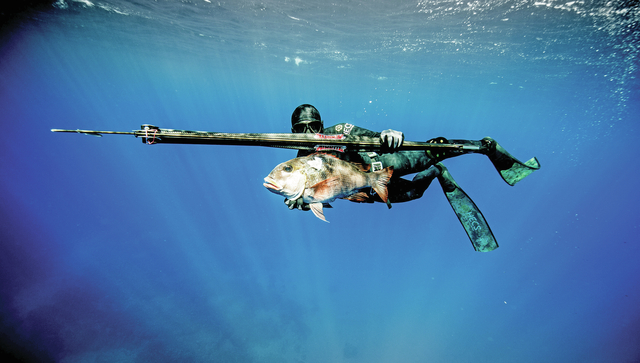Big Island firefighter Justin Lee recently returned from a trip to Syros, Greece, where he represented the United States in the 30th annual World Underwater Spearfishing Championship. ADVERTISING Big Island firefighter Justin Lee recently returned from a trip to Syros,
Big Island firefighter Justin Lee recently returned from a trip to Syros, Greece, where he represented the United States in the 30th annual World Underwater Spearfishing Championship.
Lee placed ninth overall in the World Confederation of Underwater Activities sponsored two-day event and the U.S. finished seventh in the team competition while facing 24 other countries.
“It was the best finish by an American in the past 25 years and the best a Hawaiian diver has ever finished at the world stage,” said Lee, who was in fifth place after the first day of competition, but slipped to ninth on the final day. “The team finished right behind Spain, who is usually the favorite because they have more resources and money.”
The journey to the world championship was not an easy one for Lee. First he had to qualify for the event by competing in two consecutive nationals and placing in the top three cumulatively. Lee competed in Kona three years ago and in Florida two years ago to qualify.
After qualifying, Lee’s primary focus was getting to Greece. It took him 36 hours to travel from Kona to Syros, a trip that included nearly all modes of transportation.
Lee arrived in Greece on Sept. 1, well ahead of the competition dates of Sept. 17-18. Unfortunately, the spearfisherman had little time for sightseeing. Instead, he was focused on scouting fishing locations in the Mediterranean Sea.
“The biggest challenge of scouting was that the water in the Mediterranean is so deep, you cannot see the terrain from the surface,” Lee said. “It is mostly sand and nothing really lives in the open sand, so we would have to look for clumps of rocks. Luckily for me, on the first day I found a rock in the middle of nowhere. We were the only ones to find it and I was able to score some good points. “
The points system in competitive spearfishing can be complicated. A point is given per gram of each fish weighed, as well as bonuses of 500 points for every fish caught and every new species caught. Lee says the point system is done this way to prevent someone from winning who “gets lucky” by catching one big fish.
A list of fish available to catch is given to each spearfisherman and there is a bag limit for each species.
Competitive spearfishing is very big in European countries, and those are the teams that usually dominate at Worlds. Lee admitted that he was a little star-struck when he first arrived in Syros.
“There were so many big names and multiple world champions,” Lee said. “It was like if a Pee-wee football player had a chance to attend an NFL Hall of Fame ceremony. I was standing shoulder-to-shoulder with some of the best in the world.”
Another big moment for Lee came when his father, Wade Lee, joined him in the competition as a boatman.
“I learned to spearfish from my dad and I wanted to be like him so much,” Lee said. “To have him with me was a lot of fun.”
When not spearfishing, Lee loves to bow hunt, something his father also taught him, and to surf, when the waves are around. He has been a firefighter for six years, where he supplies lots of fresh fish for Station 14, also known as the Mauna Lani Station.
Despite his many hobbies, spearfishing is Lee’s real passion and he has been able to use it to travel all over the world. For Lee, the act of spearfishing is almost like flying.
“When growing up, everyone dreams that they can fly. When I am spearfishing, and floating on the surface looking down at the fish, I feel like I am a hawk, looking down on my prey,” Lee said. “The fish have no idea, and then you go into a deep fall from the surface to the ocean floor and it is like there is no gravity. It is effortless and fun.”




